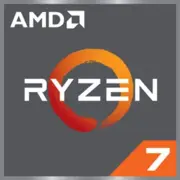AMD Ryzen 7 PRO 2700U

AMD Ryzen 7 PRO 2700U: A Versatile Processor for Mobile Tasks
April 2025
Architecture and Process Technology: Performance Foundations
The AMD Ryzen 7 PRO 2700U, released in 2018, is part of the Raven Ridge PRO line. It is built on a 14nm process technology and employs a hybrid first-generation Zen architecture that combines CPU and GPU on a single chip.
- Cores and Threads: With 4 cores and 8 threads, it delivers multitasking capabilities suitable for office and multimedia tasks.
- Frequencies: The base clock is 2.2 GHz, with a maximum Turbo Boost frequency of 3.8 GHz. However, in real-world scenarios, due to a TDP of 15 Watts, peak frequencies rarely exceed 3.4 GHz.
- Integrated Graphics: Radeon Vega 10 features 10 compute units (640 stream processors) and can reach frequencies up to 1300 MHz. While this is outdated by 2025 standards, from 2018 to 2020, Vega 10 outperformed Intel UHD 620, allowing for light gaming.
- Cache: The 4 MB of L3 cache is modest by modern standards but is sufficient for basic multithreading tasks.
Architecture Features:
- SMT (Simultaneous Multithreading) support for effective task distribution.
- Precision Boost 2 and XFR (Extended Frequency Range) technologies for dynamic overclocking based on workload and temperature.
Power Consumption and TDP: Balancing Power and Longevity
With a TDP of 15 Watts, this processor is ideal for ultrabooks and slim laptops. However, the 14nm process lags behind modern 5nm and 7nm chips (such as Apple M2 or AMD Ryzen 7000) in energy efficiency.
- Heat Dissipation: In compact chassis without effective cooling systems, the processor may throttle (reduce its frequency) under prolonged load.
- Power Management: Cool’n’Quiet and CPPC (Collaborative Power and Performance Control) technologies optimize power consumption by putting cores into low-power modes during idle periods.
Performance: Real-World Tests and Gaming Capabilities
Office Tasks:
- Web browsing with 10+ tabs, working in Google Docs and Excel— the processor handles tasks without delays.
- Rendering PDFs and running virtual machines (e.g., Docker) is possible, but with noticeable strain.
Multimedia:
- Photo editing in Lightroom: processing 24 MP images takes 2-3 seconds per operation.
- Video editing in 1080p (Premiere Pro): rendering a 10-minute video takes 25-30 minutes (with hardware acceleration).
Gaming:
- CS:GO — 50–60 FPS at medium settings (720p).
- Dota 2 — 40–45 FPS (720p, medium settings).
- Modern AAA games (2024–2025) — playable only at low settings and below HD resolution.
Turbo Mode:
Under short-term loads (up to 30 seconds), the frequency can increase to 3.6–3.8 GHz, but then stabilizes at 2.8–3.0 GHz due to TDP limitations.
Use Cases: Who is the Ryzen 7 PRO 2700U Suitable For?
- Students and Office Workers: Suitable for document work, Zoom conferences, and light editing.
- Budget-Conscious Users: Laptops with this processor can be found in 2025 for $500–700 (new models with discounts).
- Novice Gamers: Good for less demanding games or streaming through cloud services (GeForce NOW).
Not Suitable For:
- 4K video editing, 3D modeling, or running modern games at high quality.
Battery Life: How Long Will the Battery Last?
In laptops with a battery capacity of 50–60 Wh, battery life is:
- 6–8 hours for web surfing and working in Office.
- 3–4 hours under load (gaming, rendering).
Power-Saving Technologies:
- "Battery Saver" mode in Windows/Linux reduces GPU and CPU frequency.
- Adaptive brightness adjustment and disabling background processes.
Comparison with Competitors
- Intel Core i5-8250U (8th Generation):
- Similar TDP (15 Watts) but the UHD 620 graphics are weaker than Vega 10.
- Single-core performance is 10–15% better while multi-core performance is 20% lower.
- Apple M1 (2020):
- Significantly superior in energy efficiency and performance (Geekbench 6: ~2000/7500). Relevant for macOS users.
- AMD Ryzen 5 5600U (2021):
- Built on a 7nm process, with 6 cores/12 threads. 40% faster in multi-threaded tasks.
Pros and Cons
Strengths:
- Good integrated graphics for less demanding gaming.
- Supports multithreading.
- Optimized for corporate tasks (PRO technologies: encryption, remote management).
Weaknesses:
- Outdated 14nm process.
- Limited battery life compared to modern chips.
- Low performance in single-threaded tests.
Recommendations for Choosing a Laptop
- Type of Device: Ultrabooks (e.g., Lenovo ThinkPad E485) or budget models (HP ProBook 445 G5).
- What to Check:
- Cooling System: Two fans and copper heatpipes improve thermal performance.
- RAM: 16 GB in dual-channel mode for Vega 10.
- Display: IPS panel with a resolution of 1080p.
Final Conclusion
The Ryzen 7 PRO 2700U in 2025 is a choice for those seeking an affordable laptop for basic tasks. Its key advantages include:
- Affordable price.
- Versatility (work, study, light gaming).
- Reliability (PRO technologies for long-term use).
Alternatives: If the budget allows, it's better to choose a laptop with Ryzen 5 5600U or Apple M1. However, for saving $300–400 and moderate needs, the Ryzen 7 PRO 2700U remains a practical option.
Basic
CPU Specifications
Memory Specifications
GPU Specifications
Miscellaneous
Benchmarks
Compared to Other CPU
Share in social media
Or Link To Us
<a href="https://cputronic.com/cpu/amd-ryzen-7-pro-2700u" target="_blank">AMD Ryzen 7 PRO 2700U</a>